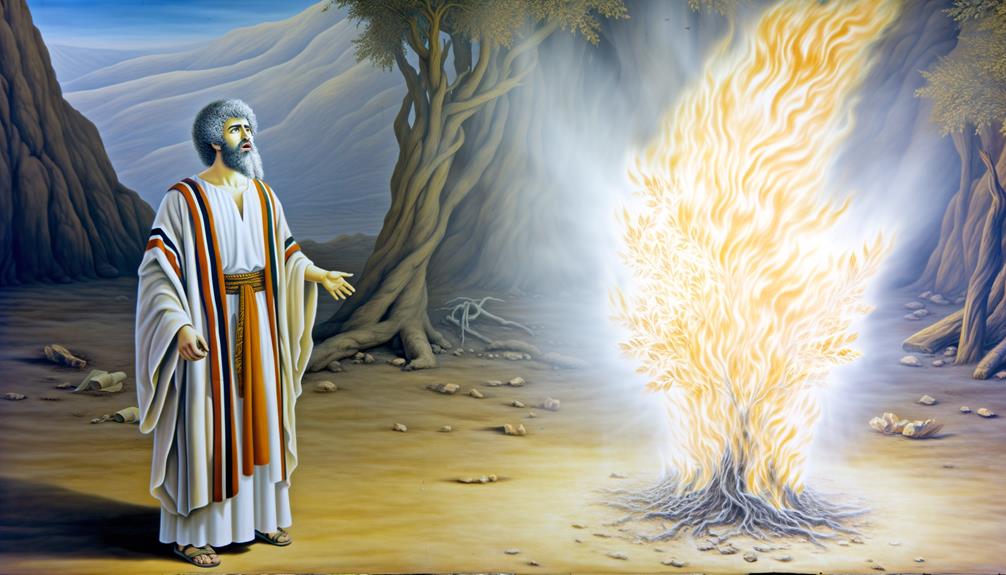I Am Who I Am Bible Verse Meaning: God’s Eternal Identity
The phrase ‘I Am Who I Am‘ from Exodus 3:14, translated from the Hebrew ‘Ehyeh Asher Ehyeh,’ signifies God’s self-existence, eternal nature, and ultimate sovereignty. It encapsulates the divine attribute of aseity, or independent existence, which defines God as the uncaused cause and the foundation of all reality.
This declaration underscores God’s unchanging and dependable character, which is central to both Jewish and Christian theologies. Understanding this profound self-revelation enriches our comprehension of God’s omnipotence, omniscience, and covenantal faithfulness.
Further exploration reveals deeper insights into the interplay between divine nature and human faith.

I Am Who I Am: Bible Verse Meaning and Divine Significance
| Aspect | Details |
|---|---|
| Phrase Meaning | God’s self-declaration of His eternal, unchanging, and sovereign nature. |
| Biblical Origin | Spoken by God to Moses at the burning bush. |
| Key Bible Verse | Exodus 3:14 – “God said to Moses, ‘I AM WHO I AM.'” |
| Common Misconception | Some interpret it as vague or mysterious, but it signifies God’s absolute existence. |
| Related Bible Verses | John 8:58 – Jesus said, “Before Abraham was, I AM.” Revelation 1:8 – “I am the Alpha and the Omega.” Isaiah 41:4 – God declares His eternal presence. |
| Application in Faith | Encourages trust in God’s sovereignty and His unchanging nature. |
| Spiritual Lesson | God is self-existent, all-powerful, and beyond human limitations. |
| Encouragement for Believers | Rest in God’s eternal presence, knowing He is always in control. |
The Context of Exodus 3:14

Understanding the context of Exodus 3:14 necessitates an exploration of the historical and theological backdrop of Moses’ encounter with God at the burning bush.
This pivotal event occurs during a period of profound oppression for the Israelites in Egypt. Moses, having fled Egypt and settled in Midian, is called by God to deliver His people from bondage.
The burning bush, a theophany, symbolizes God’s holy presence and unending power. This divine encounter is not merely a call to leadership but an invitation to understand God’s nature and promises.
The declaration ‘I Am Who I Am’ reflects the self-existence and eternal nature of God, setting the stage for the liberation narrative and revealing a profound theological cornerstone that defines the relationship between God and His chosen people.
The Hebrew Meaning

The Hebrew phrase ‘Ehyeh Asher Ehyeh,’ translated as ‘I Am Who I Am,’ encapsulates the profound and ineffable nature of God, emphasizing His self-existence and eternal presence.
This phrase, found in Exodus 3:14, is derived from the Hebrew verb ‘hayah,’ meaning ‘to be’ or ‘to exist.’ The construction suggests an ongoing, dynamic state of being, highlighting God’s continuous and unbounded existence.
In Hebrew grammar, the form ‘Ehyeh’ can be rendered as ‘I will be,’ indicating an active, unfolding reality. Consequently, the phrase not only conveys God’s immutable presence but also His active engagement in the unfolding of history and reality.
This declaration is foundational, signifying God’s ultimate sovereignty and mystery.
God’s Self-Existence

The concept of God’s self-existence, often encapsulated in the term ‘aseity,’ signifies His eternal and uncaused nature, as highlighted in various biblical verses.
This notion underscores God’s independent existence, which is not contingent upon anything external.
Through this lens, we gain a profound understanding of divine sovereignty and the foundational attributes that distinguish God’s essence from all created beings.
Eternal Nature Explained
God’s self-existence, often referred to as His aseity, underscores the profound theological concept that He is the uncaused cause, existing independently and eternally. This aspect of God’s nature is central to understanding His eternal nature, which is highlighted in the Bible verse ‘I Am Who I Am’ (Exodus 3:14). This declaration signifies God’s timeless, unchanging existence and His sovereign independence from creation.
- Unchanging nature: God remains constant and unaltered through time.
- Independence: God’s existence is not contingent upon anything else.
- Timelessness: God exists beyond the confines of temporal limitations.
- Infinite existence: God’s being extends infinitely without beginning or end.
Understanding these attributes brings deeper insight into the divine nature.
Independent Existence Defined
Understanding God’s independent existence, or aseity, reveals the profound truth that His being depends on nothing outside of Himself. This concept underscores that God is self-sufficient and self-sustaining, devoid of any need for external resources or influences. Theologically, this is significant as it sets the foundation for comprehending God’s other attributes such as omnipotence and omniscience.
| Attribute | Description |
|---|---|
| Aseity | Self-existence, independent of creation |
| Omniscience | Infinite knowledge |
| Omnipotence | Unlimited power |
| Immutability | Unchanging nature |
This table highlights key aspects of God’s nature, reinforcing the understanding that His aseity is integral to His divine essence. Such comprehension fosters a deeper reverence and appreciation for the nature of God as presented in Scripture.
God’s Eternal Nature

God’s eternal nature encompasses His timeless and unchanging essence, which underscores His self-existence and sovereignty.
This divine attribute affirms that He transcends temporal limitations and remains constant throughout eternity.
Analyzing scriptural references to God’s eternal nature reveals profound theological insights into His infinite and immutable character.
Timeless and Unchanging
The concept of God’s eternal nature underscores the theological belief that God exists beyond the constraints of time and change. This doctrine emphasizes that God’s essence is immutable and perpetual, offering a foundation for understanding divine constancy.
The phrase ‘I Am Who I Am’ in Exodus 3:14 encapsulates this timeless and unchanging nature, signifying:
- Eternal existence: God has no beginning or end.
- Immutability: God’s nature and attributes remain constant.
- Transcendence: God exists above and beyond temporal limitations.
- Reliability: God’s promises and character are steadfast.
These attributes collectively affirm the belief that God is the same yesterday, today, and forever, providing a source of unwavering faith and assurance.
Self-Existent and Sovereign
Building on the doctrine of God’s immutability, the concept of divine self-existence and sovereignty further underscores His nature as the ultimate and independent source of all existence.
This theological tenet affirms that God is uncreated, owing His existence to no other entity, thereby establishing His supremacy over all creation.
His self-existence implies that He is the necessary being upon whom all contingent beings rely.
Sovereignty, in this situation, denotes God’s absolute authority and control over the universe, orchestrating events according to His divine will.
These attributes collectively highlight God’s eternal nature, affirming that He is not subject to temporal constraints or external influences, hence rendering Him the foundational bedrock of all reality and existence.
Theological Implications

Interpreting the theological implications of a Bible verse necessitates a profound understanding of its historical, cultural, and doctrinal contexts.
The phrase ‘I Am Who I Am’ encapsulates God’s eternal, unchangeable nature and His self-sufficiency, offering several profound theological insights:
- Divine Sovereignty: God’s authority and control over all creation.
- Immutability: God’s unchanging nature across time.
- Self-Existence: God’s existence independent of any external factors.
- Eternal Presence: God’s continuous presence throughout past, present, and future.
These themes underscore the fundamental attributes of God, inviting believers to trust in His unchanging and sovereign nature, thereby deepening their faith and understanding of divine mystery.
Biblical Cross-References

Numerous passages throughout the Bible elucidate and reinforce the profound theological themes encapsulated in the phrase ‘I Am Who I Am’. This declaration, found in Exodus 3:14, serves as a cornerstone of God’s self-revelation and underscores His eternal nature and unchanging character. As believers reflect on this profound truth, they are reminded that their worth and identity are anchored not in their own accomplishments, but in the unwavering love and grace of God. The phrase ‘i am enough meaning bible verse‘ encapsulates this understanding, emphasizing that our sufficiency comes from Him alone, regardless of life’s circumstances.
One notable cross-reference is found in Isaiah 43:10, where God declares, ‘Before Me no god was formed, nor will there be one after Me.’ This echoes the self-existent, unchanging nature of God.
Similarly, in Revelation 1:8, God proclaims, ‘I am the Alpha and the Omega,’ underscoring His eternal presence.
John 8:58 further deepens this understanding when Jesus states, ‘Before Abraham was born, I am!’
These passages collectively affirm God’s eternal, self-sufficient existence, highlighting the continuity of divine revelation from the Old Scripture to the New Scripture.
Interpretations in Judaism

In Judaism, the interpretation of Bible verses often centers around profound theological concepts such as Divine Self-Existence, which underscores God’s independent and uncaused nature.
This is closely related to the notion of God’s Eternal Presence, emphasizing His timeless existence and ongoing relationship with humanity.
Additionally, the themes of Covenant and Identity are pivotal, as they elucidate the unique bond between God and the Jewish people, solidifying their communal and individual identities within a sacred framework.
Divine Self-Existence Concept
The concept of divine self-existence, or aseity, in Judaism is profoundly encapsulated in the Tetragrammaton, YHWH, which signifies God’s eternal and independent nature. This sacred name reveals several core attributes:
- Independence: God exists without reliance on anything outside of Himself.
- Eternality: God’s existence is timeless, without beginning or end.
- Unchangeability: God remains constant and unaltered through time.
- Sovereignty: God holds supreme authority and power over all creation.
In Jewish theology, these attributes underscore a God who is fundamentally different from His creation, existing in a state of complete self-sufficiency and absolute authority, embodying the essence of ‘I Am Who I Am.’
God’s Eternal Presence
Building upon the understanding of divine self-existence, Jewish interpretations of God’s eternal presence explore how this timeless nature manifests in the lived experience and theological reflections of the faithful.
The Hebrew term ‘Ehyeh-Asher-Ehyeh,’ commonly translated as ‘I Am Who I Am,’ emphasizes God’s immutable and perpetual existence.
Rabbinic thought often portrays this as a source of unending comfort and assurance, recognizing God’s presence in every moment of history and in every personal experience.
This concept fosters a profound sense of stability and continuity, as God is perceived as the eternal foundation and ultimate reality.
Theological reflections in Judaism consequently underscore an intimate, enduring relationship between the divine and humanity, grounded in God’s unwavering presence.
Covenant and Identity
Exploring the covenantal relationship in Judaism reveals how this sacred bond shapes Jewish identity and theological understanding. Central to this dynamic is the declaration ‘I Am Who I Am’ (Exodus 3:14), which underscores God’s immutable nature and His commitment to the Jewish people. This phrase, interpreted within the framework of the covenant, emphasizes divine constancy and the assurance of God’s promises.
The covenantal relationship encompasses:
- Divine Selection: God’s choice of Israel as His people.
- Law and Commandments: The Torah as a guide for living.
- Mutual Commitment: Obligations between God and Israel.
- Historical Continuity: Connection to ancestral promises.
This profound relationship is foundational to Jewish self-understanding and spirituality.
Interpretations in Christianity

In Christianity, interpretations of Bible verses often vary considerably based on theological perspectives, denominational doctrines, and historical contexts.
The phrase ‘I Am Who I Am‘ from Exodus 3:14, for instance, is profoundly examined within different Christian traditions. Some view it as an assertion of God’s eternal self-existence and unchanging nature, emphasizing His sovereignty and transcendence.
Others interpret it as a revelation of God’s intimate involvement with humanity, suggesting a dynamic and relational aspect of His nature.
Additionally, the Hebrew phrase ‘Ehyeh Asher Ehyeh’ is sometimes rendered to underscore God’s mystery and incomprehensibility.
These diverse interpretations reflect the rich tapestry of Christian thought, illustrating how this verse continues to inspire theological reflection and understanding across various Christian communities.
Influence on Christian Doctrine

The diverse interpretations of Bible verses, such as ‘I Am Who I Am’, have greatly shaped Christian doctrine, influencing theological formulations and ecclesiastical teachings throughout history. This enigmatic declaration from Exodus 3:14 has been pivotal in defining the nature of God and His relationship with humanity.
Its influence can be observed in various doctrinal tenets:
- Theology Proper: Understanding God’s self-existence and immutability.
- Christology: Jesus’ use of ‘I Am’ statements in the New Covenant.
- Soteriology: God’s unchanging promise of salvation.
- Ecclesiology: The Church’s mission rooted in God’s eternal presence.
Thus, ‘I Am Who I Am’ continues to be a cornerstone in Christian theological discourse.
Modern-Day Relevance

Many contemporary Christians find profound personal and communal significance in the enduring declaration ‘I Am Who I Am‘. This phrase, originating from the Hebrew Scriptures, conveys God’s eternal and self-sufficient nature, offering a timeless foundation for faith.
In modern contexts, believers interpret this declaration as a call to trust in God’s unchanging character amidst a rapidly evolving world. It serves as a reminder of divine constancy and reliability, providing solace and strength. This interpretation encourages individuals to cultivate faith through prayer and study, fostering a deeper understanding divine calling in scripture. By grounding themselves in these timeless truths, believers can navigate uncertainties with confidence and peace. Ultimately, this unwavering trust in God’s nature allows them to face challenges with a sense of purpose and hope.
In addition, ‘I Am Who I Am’ encourages a deeper exploration of one’s identity in relation to the divine, fostering spiritual growth and resilience. Consequently, this ancient proclamation continues to resonate, grounding contemporary faith in a sense of divine presence and purpose.
Conclusion
The declaration ‘I am who I am’ in Exodus 3:14 emerges as a beacon of divine self-revelation, illuminating God’s self-existence and eternal nature.
This profound statement, like an unfathomable ocean, invites endless theological exploration.
Its reverberations resonate through the corridors of Jewish and Christian thought, shaping doctrines and faith practices.
In contemporary contexts, this timeless assertion continues to inspire, offering a steadfast anchor in an ever-changing world.






